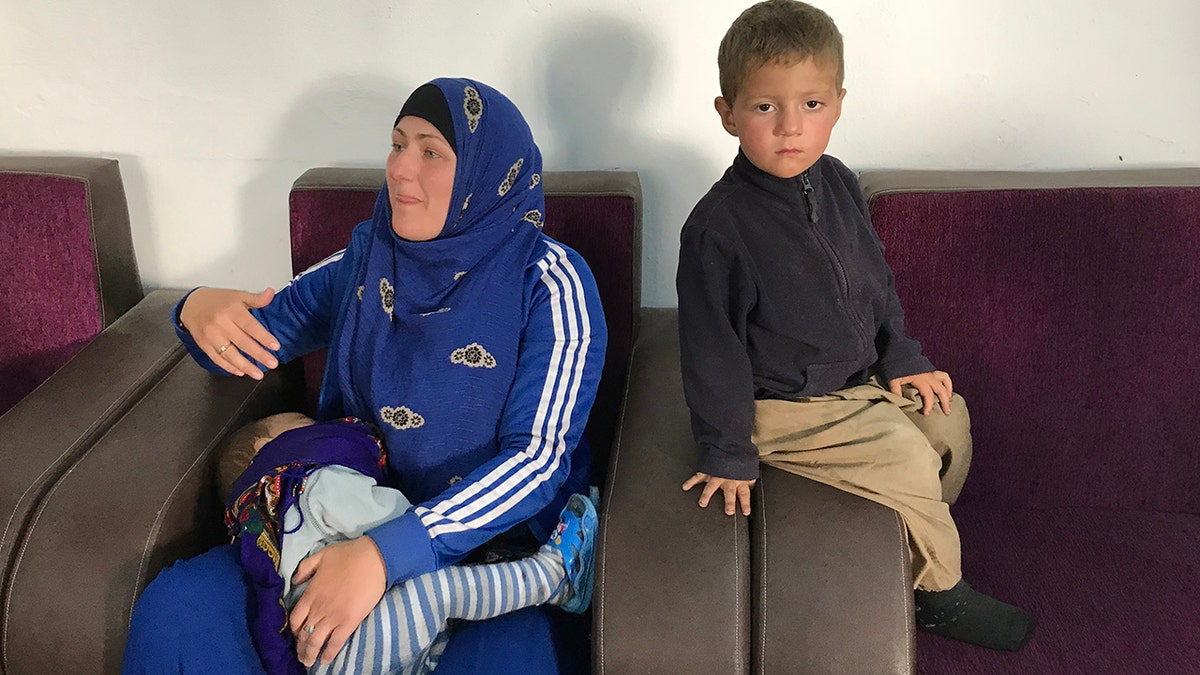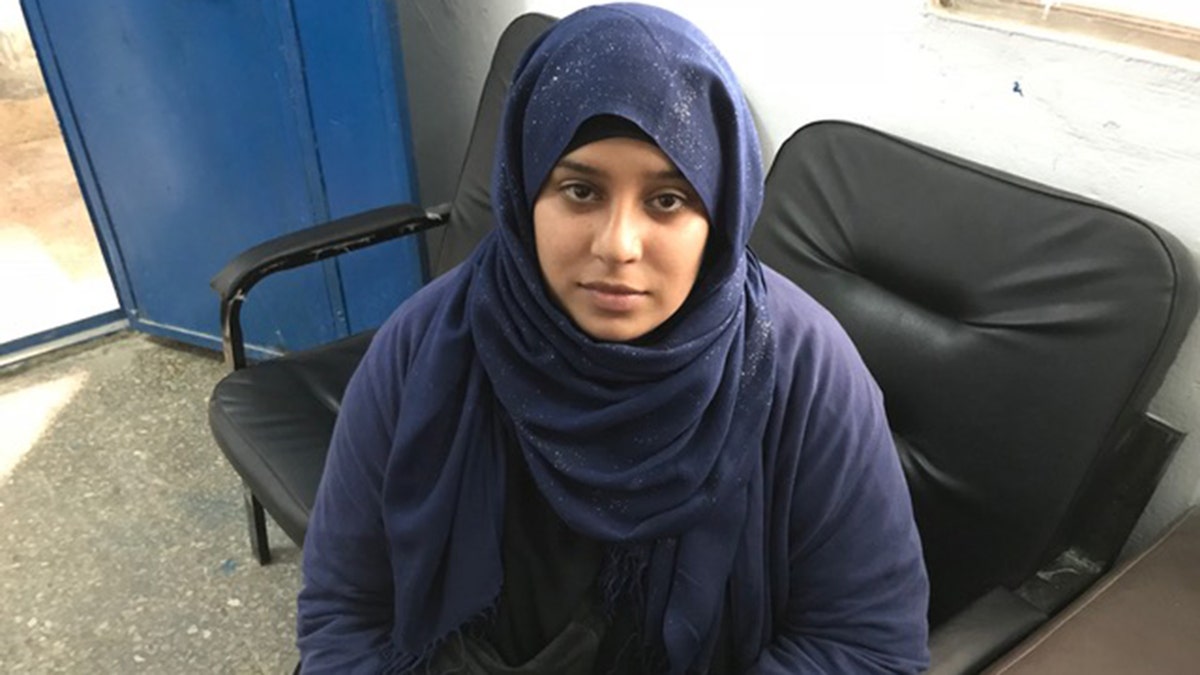
Lena Frizler talks of returning to her native Germany, but fears her children will be taken from her. (Hollie McKay/Fox News)
AIN ESSA, Syria – One might assume they have much in common, given their special status as foreign wives and widows of ISIS fighters.
But many of the women being held in this displacement camp - abandoned by home countries that don't want them back - are leading a life marred by in-fighting, jealousy and stealing from one another out of spite.
“They have a lot of internal conflicts between them. At least twice a week there is physical punching and fighting breaks out,” an official for the camp, which is operated by the U.S.-backed Syrian Democratic Forces (SDF), told Fox News.
Most of the altercations seemingly stem from arguments involving their children, as well as accusations of theft.
The 123 women being held are tended to like any other group in need at the Ain Essa facility, some 50 miles from former ISIS “caliphate” capital of Raqqa. Ranging in age from 18 to 70, most of the women also have an average of three to four young children fathered by ISIS fighters.
The women are held in a guarded section, away from the rest of the camp, for fear of retaliation by angry locals who suffered at the hands of the terrorist group.
“The civilians do not accept these women,” the official said. “But we deal with them as we deal with any civilians, not as ISIS members or wives.”
But the official complained many of the women are resentful and ungrateful - often throwing the food they have been given on the ground, and treating those guarding them with disrespect.
Then there's the problem of their radicalization. Officials estimate only 20 percent of the women have "changed their extremist minds," making the strong majority a continued security threat.
Lena Frizler, a 28-year-old from Hamburg, Germany, was once an aspiring business student, converted to Islam in 2012, and left the comforts of her home for Turkey after being encouraged by known radical salafist in the Hamburg area - Pierre Vogel - to fight against the Syrian regime.
“One day my husband came home and told me he wants to go to Syria and fight,” Frizler told Fox News, while she nursed her one-year-old son - her second child to an ISIS fighter.
Frizler’s husband, who named himself Abu Bilal, joined Syria’s al Qaeda affiliate, al-Nusra. After being captured and released in a prisoner exchange with the Free Syrian Army (FSA), Bilal was killed in a friendly fire incident in 2013.
Frizler, who was pregnant at the time, appealed to a prominent ISIS leader in Raqq, and asked permission to go back to Turkey. She was instead sent off to a desert area for intensive Islamic training.
“There was a special place there they sent all the widows,” Frizler said.
But after giving birth, and a botched effort to be smuggled out, Frizler ended up in an ISIS prison. She was then married off to an Afghan man, who called her “a bitch,” and physically abused her.
“Even if I gone home now from this camp I am scared that they will take my children from me. But I want to send them to a good school, and have a good life like I had,” Frizler cried. “From the moment I got to Syria, I just wanted to go home.”

Heida Raufi says she is writing a book in the hopes of preventing other women from making the same “mistake” she did. (Hollie McKay/Fox News)
Another German native, 26-year-old Heida Raufi, said she spends most of her days alone in her tent. She said she wants to avoid the gossiping and distrust among the other women, and is also writing a book in the hopes of protecting other women from making the same “mistake” she did.
Raufi said she fell in love with an older boy in 2009, who several years later said he was going to “help” the people of Syria. Lovestruck, Raufi ditched her social work studies for the life of an ISIS wife in 2014. Her partner, Kareem, died on the battlefield.
For the next 18 months, Raufi spent some $8,000 her family had sent her on three attempts to be smuggled home. The alleged smuggling operations were scams: Raufi was driven around in the desert, and simply returned home. She decided all she could do to make ends then meet was to remarry.
“It was an easy process. There was an ISIS man we all knew with a laptop, and he would just ask us what we wanted and bring us guys to choose,” she recalled. “I met three, but I chose a man from Kosovo blinded by shrapnel because he wanted to go to Turkey for an operation. I hoped I could get out that way.”

ISIS widows living in the Ein Essa displacement camp face an uncertain future. (Hollie McKay/Fox News)
But now she's just looking to return home to Germany.
“I was in love. It was a mistake,” she said. “But I’m ready to go home, I am ready to go to prison. I just cannot stay a minute longer here... but if I cannot leave, at least let me work, volunteer or tutor school students like I used to.”
Other foreign wives held here seemed more committed to the cause. Khala Ahmed, 43 from Karachi, Pakistan, left with her husband and children to “fight for the Syrian people.”
“My husband was very upset after seeing a UNICEF documentary about the war in Syria,” said Ahmed, who has six children, ranging in age from 2 to 14. “He wanted to fight Bashar. My husband sold our house and all our things for us to leave. He used to be a normal man, worked in telecommunications. But he made a mind change.”
Ahmed hopes her husband, who is missing in action, is in prison somewhere. But in the meantime, she still sees signs of the ISIS “caliphate” coming to life. “I still think it might come back,” she said. “We are waiting.”
All the women interviewed by Fox News said they are prepared to receive visits from representatives from their home governments. And those running the resource-depleted camp are anxious for a solution.
“Most countries don’t want them, and most of them are too scared to go back,” said the official, who added the women's children are being sent to a "deradicalization" school in the camp.
“But we can’t keep them here forever,” he said with a shrug. “Someone needs to help here."







































